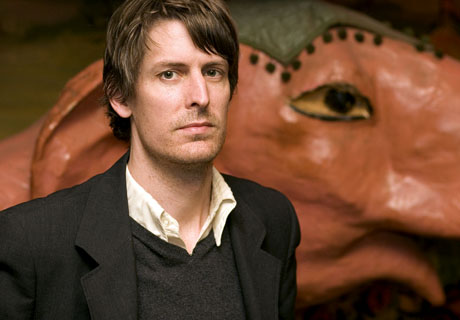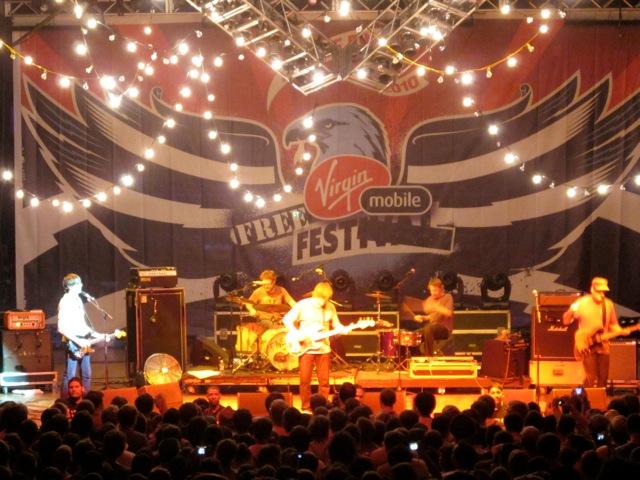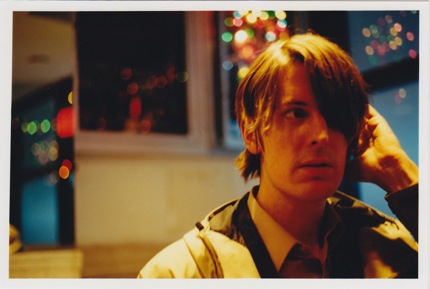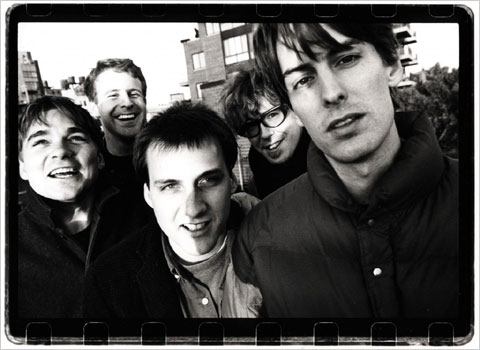
Stephen Malkmus is the slacker king who can't help it. That he's not even a slacker makes his elevation more remarkable still. He's knowing in the extreme, given to sly humor, and expert at carrying himself with a detachment that's almost aristocratic. His songs embrace irrepressible rock but can quickly unwind into downbeat ruminations--they're at once arch and melodic. He's a prolific guitarist who knows better than to believe the adoration. But the devotion is real, and the Pavement reunion has triggered sell-outs and inspired reflection on one of the 1990's best bands. Should you suspect he's nearing chronic self-awareness listen to 'Here,' which he sings with such empathy and world-weariness that you'll be unexpectedly transported. In the end, the surprising triumph of Stephen Malkmus is that he allows us to be romantic about things we know we should have outgrown--his songs undermine our skepticism and, while they last, we suspend a collective sense of disbelief.
We spoke before Pavement's show at the Virgin Mobile FreeFest. 
You live in Portland, do you like the Blazers?
They're a boring team, I don't like them that much. I'm actually kind of a Thunder fan. Kevin Durant is great, and I like Russell Westbrook. I like UCLA guys, I'm from LA.
There's a hysterical interview you gave about rotisserie basketball.
Somehow I got to be sort of a talking head for that because this friend of mine runs this NBC site called Rotoworld. It's kind of like the fantasy center. The guys that work there, Steve Alexander, 'Dr. A.,' is the fantasy basketball guy, and there's Greg Rosenthal who went to Tulane--they're nerdy, smart guys, not like your typical 'wear a jersey' football people. They're into advanced sabermetrics, even for football. But the basketball league is the most fun because it's the most rock 'n' roll. People in my band are into it, and the girls like basketball more because the guys are cute, you can see their bodies, and they're good athletes.
So what do we think about Miami now that they've got this evil empire?
Everyone hates it. It's bad for the league. LeBron's kind of a jerk, from what I understand from people in the Cleveland media that know him. He's kind of spoiled and no one stops him. But he's been entitled to do that and he's the artist. He should be able to do what he wants, if you're in that position, you know it is a business. And you're a kid, you want to be with your friends and win. I'm not mad at him, but I still want them to lose.
A friend from Eugene, Oregon, and a serious Blazers fan, said he'd never in his whole life seen Jeff Lamp on any greatest-Blazers-of-all-time list. I didn't know who he was, I had to go and look him up.
He played at my college--I went to UVA. He was a white boy who could've chucked threes or something, but he never really made it very far in the NBA.

We Aren't Underused: Pavement at the Merriweather Post Pavilion, 2010.
There was an interview recently in the Times and Woody Allen, another basketball fan incidentally, was saying he'd never watched any of his films after the year they came out. What's it like coming back to your old songs now that you have a family and are in a different position in life?
Maybe if he watches those he'll get inspired--his new movies aren't up to the standards of his golden era. There are people that like my new stuff, but it probably wouldn't be a bad thing for me to try to find out what's good about Pavement by playing those songs. Maybe that'll seep in after this is all over I can recapture that. It's like that story with the old superhero jersey that you look at this dusty old thing and the world needs you now, and you say alright, I'll put it on again.
Do you like that type of introspection or is it just nice to be back experiencing the immediacy of playing shows?
That's what it is. There's a sense that there are people, aside from us, that care about it. It's seeing people who worked on it, catching up with people on the industry side that helped us become successful, if you can call it that. People that worked on publicity for no money. They're like 'we always believed in your talent and it's great to see it again.' And everyone in the crowd is still touched by these songs that are old, but still have a sort of immediacy, at least for this year.
Were you surprised that shows sold out in two minutes?
Not for New York, that was always our stronghold. And the way the country has become since Pavement started--we used to go to Denver, or some college towns and it would be somewhat cool. But it feels like this country is getting more and more coastal, people are moving just to Williamsburg, or, of course there's Austin or Portland, they're nice places. But it really feels like it's San Francisco and New York. So I figured in New York people would be into it. So that's how it's been, and Chicago we had good turnouts, but other shows were smaller.

Star of the Slipstream. Malkmus in 2000. Photo: Gail O'Hara.
Do you think Pavement would have been a different band if it existed now with Pitchfork and other sites paying microscopic attention to everything you do? Can such a willfully independent band exist now?
I think it can. It just comes down to an individual songwriter and if the songs are good. Of course, all the ephemera that influence the band when it started were very specific to that time. But to me, it was more based on the musical climate, in terms of what had already been scavenged from the past and what the immediate past was, in terms of the sort of hair metal and college music. It all became more established at that time and people got into that--they were tired of old music and we were fresh.
So if you're talking about now, I think it could happen. It happened for a band like Vampire Weekend, which is a different kind of thing but you know they just came out and seemed really odd and different, and people were kind of mad at them because they were preciously preppy or something, but they just sort of blew in like some fresh air.
Vampire Weekend got successful so quickly and then there was a backlash and people were getting upset about their cardigans or if they liked Nantucket or whatever. Do you follow this type of thing?
I don't really follow it, but I know that it's still going on. You know there's a concern with things being new and current and marketable. But there are still kids, and not to sound hokey, but there are kids in basements playing, kids that like the Velvet Underground more than they like Kanye West. And that's always going to be there. It's like the Beatles--those things are so embedded in people's minds, the sort of values of the way those things sound, and what's a good song. That's still there with young people, and it's not just old people telling them it's good.
It's like there's a desire for some type of, not eccentricity, but some sort of quality that is missing from bands these days. Or if bands do have it it feels too studied.
With bands like Pavement and Silver Jews and Belle and Sebastian, there's more of an effort on the lyrics. In the end, even if ours seem to be sort of, not complete, they're good lyrics. And that's kind of a problem these days, there's not much on that side. Rappers come and actually say things to people directly that really speak, that take an actual slant on their world. I think really people want that more than anything else, something that creates a world that's really clear. Instead of something vague and just just goes with the music. That's what I tend to hear but I don't listen so closely, so I might be missing something.

In their younger and more vulnerable years. Photo: Gail Butensky.
Is it true that you worked at the Whitney Museum?
I did. My wife, Jessica Jackson Hutchins, was in the Biennial this year. Her main piece was an Obama couch. She gets lumped in with the people doing ceramics with cheap materials but really her stuff is not narrative, it's just really pure and open. She's doing well. Charles Saatchi bought some of her stuff, she has a show at Timothy Taylor Gallery in London. So she's in a great position, she's in a position like what I was with Pavement, except she's almost forty, but that's the way it goes in art sometimes.
Are you interested in art or do you just say that's her deal and try to be supportive?
I know that she's good, I could support her more. I don't get worried about whether she's getting successful or not, it's just like, make it good. But she's ambitious, you don't get that far if you're not ambitious. We have a lot of friends that are artists. It's a totally different world from music, it's kind of weird.
It's funny the difference between interviewing artists and musicians.
She did one with Bomb and some other art magazine and it was back and forth and all very serious. But you know if you're not serious it sounds dumb too. If you're just like 'I don't care, you know, I'm into the Stones and drinking beer' people are just going to be like 'fuck you.'
What's the question that everyone asks that you don't want to answer?
It's hard to say, it just kind of depends. Obviously the one where it's like, do you write the words or the music first, it's kind of a corny one people ask.
That's funny--though I admit I'm curious. I asked Aimee Mann that, and she said music first.
I think everyone does music first, because the words are the hard part, except for maybe a couple people, like David Berman.
He's brilliant, where does he come up with a line like 'the alleys are the footnotes of the avenues'?
Yeah. He just kind of saws at the guitar and comes up with decent melodies and genius words.
Was there a clear division of labor on the Silver Jews--what was the interaction like between you two?
It was his band and I was just on the one album, American Water. I sort of took that one over a little bit, not completely, but it was just like 'I'll sing with you and we'll just sing in the same range.' And you know double vocals sound nice but it'll kind of even out your singing. That album was a little more barky. And then later on he went more for of a deep croon, so I wouldn't have been able to sing with that, cause it wasn't as rock 'n' roll anymore. He's a little bit country and I'm more rock 'n' roll.